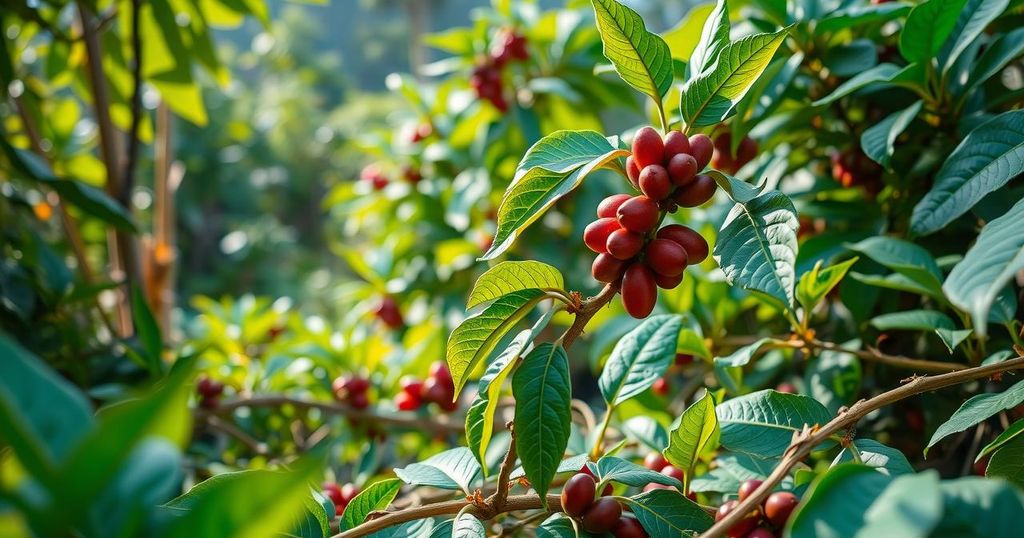Amidst climate change challenges, South Sudan is exploring the cultivation of Excelsa coffee, a resilient species that could address coffee production declines. Local farmers are optimistic about its potential to improve their economic conditions and send their children to school. However, logistical challenges and regional instability complicate efforts to expand this emerging industry.
As climate change adversely affects coffee production globally, South Sudan is exploring a resilient coffee species called Excelsa. Native to South Sudan and a few other African nations, this species demonstrates remarkable resistance to drought and pests, potentially providing a solution to declining coffee yields in regions increasingly affected by adverse weather. Various local farmers, like Catherine Bashiama, are planting Excelsa in hopes of improving their economic futures while sending their children to school.
Excelsa coffee, discovered over a century ago in South Sudan, is gaining attention amid a global coffee crisis primarily driven by climate change. As leading producers encounter severe droughts that threaten coffee yields, prices have surged to record highs. Experts anticipate Brazil, a major coffee producer, may see a significant drop this year, possibly around 12% in their harvest. Developing reliable coffee varieties such as Excelsa is crucial for mitigating these issues in the coffee market.
Despite its potential, Excelsa coffee only accounts for less than 1% of global consumption, lagging behind the more familiar Arabica and Robusta. Experts emphasize the need to scale up production and efficiently demonstrate Excelsa’s viability for it to fill shortfalls due to climate challenges. Historically, coffee was not a cornerstone of South Sudan’s agriculture due to various conflicts disrupting farming practices and knowledge.
Once a prominent crop in the region, coffee cultivation declined as conflicts forced many farmers away. As recent visitors observe the revitalized interest in coffee farming, they note that while many are familiar with Excelsa, they may not fully understand its unique characteristics, including its impressive height and a deliciously sweet flavor with chocolate and dark fruit notes.
Ian Paterson, managing director of Equatoria Teak, expressed enthusiasm for the trials conducted on Excelsa, noting initial results are promising due to better heat resistance compared to other species. The company aids local farmers by providing seedlings and necessary training, with initial yields encouraging hopes for economic benefits, including exports to specialty markets in Europe.
However, the logistics of transporting coffee from South Sudan present substantial challenges due to infrastructural issues and ongoing instability. The journey to the nearest port involves significant costs and risks, compounded by pockets of violence that discourage investment in the agricultural sector. This uncertainty hinders the potential growth of South Sudan’s coffee industry despite optimistic forecasts.
Coffee farming is not solely an economic opportunity but also a means for farmers to escape poverty, as indicated by testimonies from local cultivators like Bashiama, who hopes for educational investments for her children. Excelsa presents a chance for local communities to achieve financial autonomy, reducing dependence on governmental support. Community leaders assert that realizing the coffee’s potential necessitates stability and a long-term focus on cultivation.
Local challenges persist, with farmers facing crop damage from uncontrolled fires and the instability associated with conflicting regional tensions. Elia Box, a farmer, expressed despair over crop losses due to fires while emphasizing the need for a peaceful environment conducive to consistent agricultural development. Overall, the pathway to a thriving coffee culture in South Sudan is contingent upon establishing stability and supporting a long-term investment in coffee cultivation.
In summary, South Sudan is at a critical juncture as it seeks to revitalize its agriculture through the cultivation of Excelsa coffee, a species resistant to climate adversities. As local farmers embrace this opportunity to combat poverty and possibly secure educational futures for their families, they face significant challenges. The need for stability and appropriate infrastructure remains paramount as the region aspires to contribute meaningfully to the global coffee market.
Original Source: apnews.com




